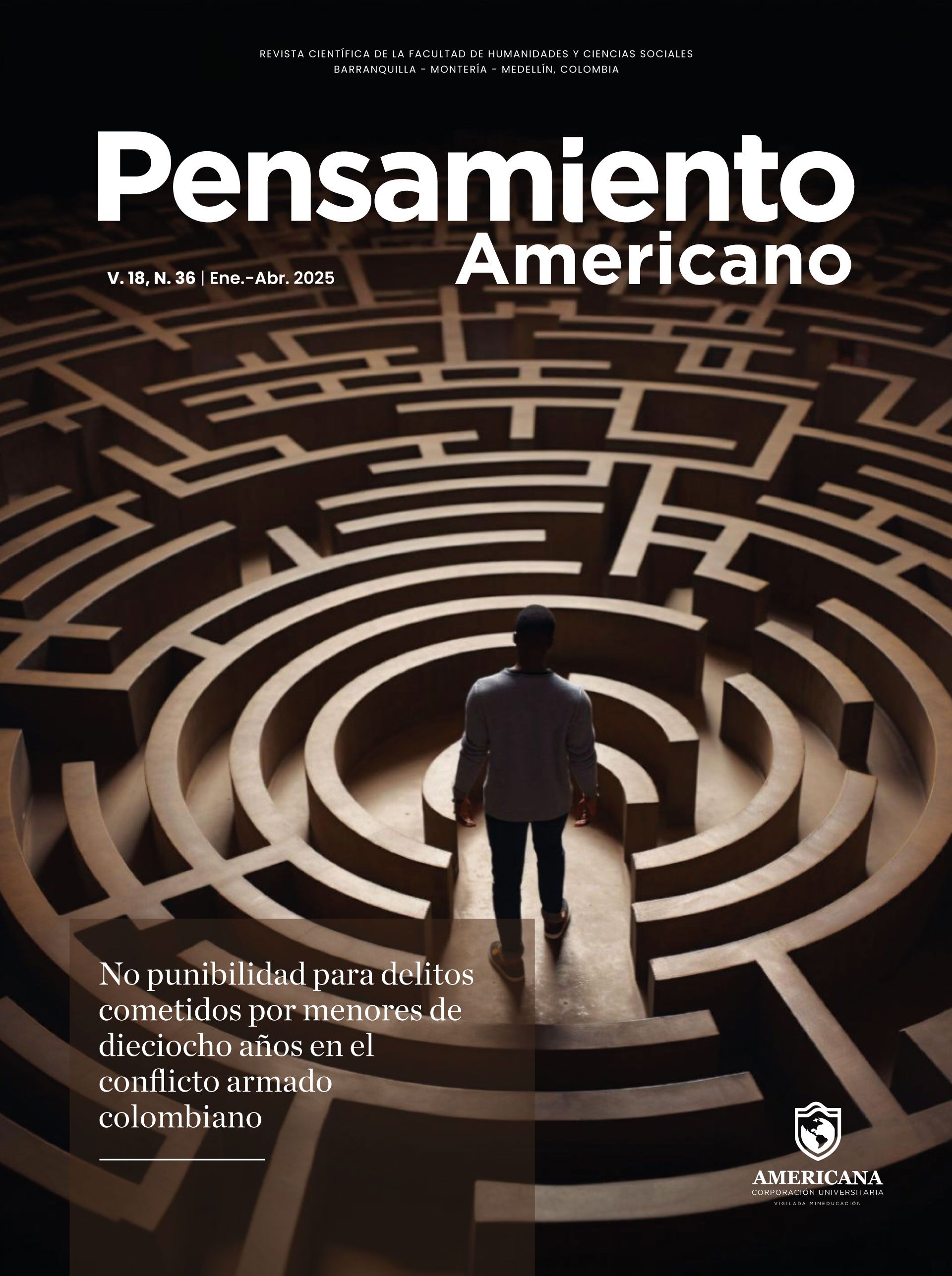No punishment for crimes committed by teens in the middle of the colombian armed conflict
DOI:
https://doi.org/10.21803/penamer.18.36.775Keywords:
Restorative justice, Criminal policy, Crime prevention, JuvenilesAbstract
Introduction: The article examines the non-punishability of crimes committed by minors under 18 and over 14 years of age in Colombia. Objective: to clarify why the non-punishment of such conducts is part of the law applicable to adolescents. In addition, the justification behind the application of restorative justice in the juvenile criminal field is presented, as well as the use of premial and negotiated justice in this context. Methodology: The research was carried out using an analysis-synthesis methodology within the framework of a qualitative and descriptive socio-legal study. The text also describes how transitional justice is implemented in Colombia, especially restorative justice, to address the legal-criminal problems arising from the non-international armed conflict. Results: In order to obtain the results, secondary sources that address the sanctions applied to adolescents involved in criminal law for acts committed during the Colombian armed conflict were used. Conclusions: Finally, the reasons behind the decision not to impose sanctions on those who, being minors, committed crimes in this context are analyzed.
Downloads
References
Acto legislativo 01 del 2017. (2017, 4 de abril). Diario Oficial No. 52.964. http://www.secretariasenado.gov.co/senado/basedoc/acto_legislativo_01_2017.html
Alarcón-Palacio, Y. E. (2019). Reclutamiento forzado de niños y niñas (abduction) en el conflicto armado colombiano: los menores de 18 años como víctimas con protección especial reforzada en el DIH y DIDH. Vniversitas, (138).
Arango Tobón, M. (2021). Procesos de acompañamiento psicosocial en el marco del conflicto armado: una revisión crítica de la literatura. Revista Virtual Universidad Católica del Norte, (62).
Bedecarratz Scholz, F. J. (2018). La indeterminación del criminal compliance y el principio de legalidad. Política criminal, 13(25).
Colás Turégano, A. (2015). Hacia una humanización de la justicia penal: la mediación en la justicia juvenil española. Principios y ámbito aplicativo en la LO 5/2000, reguladora de la responsabilidad penal de los menores. Iuris Tantum Revista Boliviana de Derecho, (20).
Convención sobre los Derechos del Niño. http://www.un.org/es/events/childrenday/pdf/derechos.pdf
Corte Constitucional, Sentencia C- 050-2020. 12/02/2020. MP. Gloria Stella Ortiz Delgado
Corte Constitucional, Sentencia C-240/0901/04/2009. MP. Mauricio González Cuervo.
Corte Constitucional. Sentencia C-253A/12, 29/03/2012. MP. Gabriel Eduardo Mendoza Martelo.
Corte Suprema de Justicia, Radicado No.96791, 27/02/2018. M.P. Patricia Salazar Cuellar.
De la Cruz, F; Quispe, D. (2023) Soldados, víctimas y enemigos: el derecho del targeting y los niños asociados con grupos armados.
Fisco, Sonia. Atroces realidades: la violencia sexual contra la mujer en el conflicto armado colombiano. Papel político, 2005, No 17.
ICBF. Lineamiento técnico administrativo de ruta de actuaciones para el restablecimiento de derechos de niños, niñas y adolescentes con sus derechos inobservados, amenazados o vulnerados. 2016, Disponible en: https://www.icbf.gov.co/sites/default/files/procesos/lm3.p_lineamiento_tecnico_ruta_actuaciones_para_el_restablecimiento_de_derechos_nna_v1.pd
Ley 1098 del 2006. (2006, 8 de noviembre). Congreso de la República. Diario Oficial No. 46.446. http://www.secretariasenado.gov.co/senado/basedoc/ley_1098_2006.
Ley 1421 de 2010. (2010, 21 de diciembre). Congreso de la República. Diario Oficial No. 47.930. http://www.secretariasenado.gov.co/senado/basedoc/ley_1421_2010.html
Ley 1922 de 2018. (2018, 18 de julio). Congreso de la República. Diario Oficial No 50.658. http://www.secretariasenado.gov.co/senado/basedoc/ley_1922_2018.html
Ley 1957 de 2019. (2019, 6 de junio). Congreso de la República. Diario Oficial No 50.976 http://www.secretariasenado.gov.co/senado/basedoc/ley_1957_2019.html
Londoño, M. C. (2010). El principio de legalidad y el control de convencionalidad de las leyes: confluencias y perspectivas en el pensamiento de la Corte Interamericana de Derechos Humanos. Boletín mexicano de derecho comparado, 43(128).
Orduz, C. P. (2010). El principio de legalidad en la ley penal colombiana. Criterio jurídico garantista.
Rodrigues Gonçalves, J. V. ., & Simancas Trujillo, R. A. (2020). De La Esquina A La Oficina: Un Análisis Sobre La Ausencia De Mujeres Transgénero En El Mercado Laboral Formal En Goiás. Pensamiento Americano, 13(26), 33-50. https://doi.org/10.21803/penamer.13.26.419
Torres Vásquez, H. (2023). Política criminal y responsabilidad penal adolescente. Revista Academia & Derecho, 14(27), 1-20.
Torres Vásquez, H., & Cruz Orduña (2022). La aplicación de justicia restaurativa en Colombia y la no vulneración del principio de legalidad penal. Saber, Ciencia Y Libertad, 17(1), 175–198, p. 193. Disponible en: https://doi.org/10.18041/2382-3240/saber.2022v17n1.8446.
Torres Vásquez, H., & Tirado Acero, M. (2023). Las sanciones en el Sistema de Responsabilidad Penal Adolescente en Colombia. Revista Científica General José María Córdova, 21(41), 131-148.
Torres Vásquez, H., (2024). Manual de Procedimiento Penal, editorial Nueva Jurídica.
Torres Vásquez, H., Beltrán, Echeverry; Vargas, (2021), El modelo de justicia transicional y su relación con la justicia retributiva en Colombia. Boletín Redipe, vol. 10, No 6.
Torres Vásquez, H., Manual de procedimiento ante la jurisdicción especial para la paz, Universidad La Gran Colombia, 2022.
Downloads
Published
Issue
Section
License
Copyright (c) 2025 Pensamiento Americano

This work is licensed under a Creative Commons Attribution-NonCommercial-NoDerivatives 4.0 International License.
The author or authors of an article accepted for publication in the Journal Pensamiento Americano will transfer all of the patrimonial rights to the American University Corporation free of charge, within which are included: the right to edit, publish, reproduce and distribute both print media as digital, in addition to include in article in international indexes and / or databases, likewise, the Editorial Seal is authorized to use the images, tables and / or any graphic material presented in the article for the design of covers or posters from the same magazine. By assuming the patrimonial rights of the article, it may not be partially or totally reproduced in any printed or digital media without its express permission.
AUTHORITY ASPECTS
For the Pensamiento Americano Journal, all the authors of an article have made substantial contributions to the research and the manuscript, and they share the responsibility when the article presents errors, fraud in some way or violations of copyright.
After submitting an article, the journal does not accept the addition, deletion or change in the order of the authors, in addition we reserve the right to release the article when it has been submitted to the journal and under no circumstances will American Thought accept the article. withdrawal of an article during any phase of the editorial process






